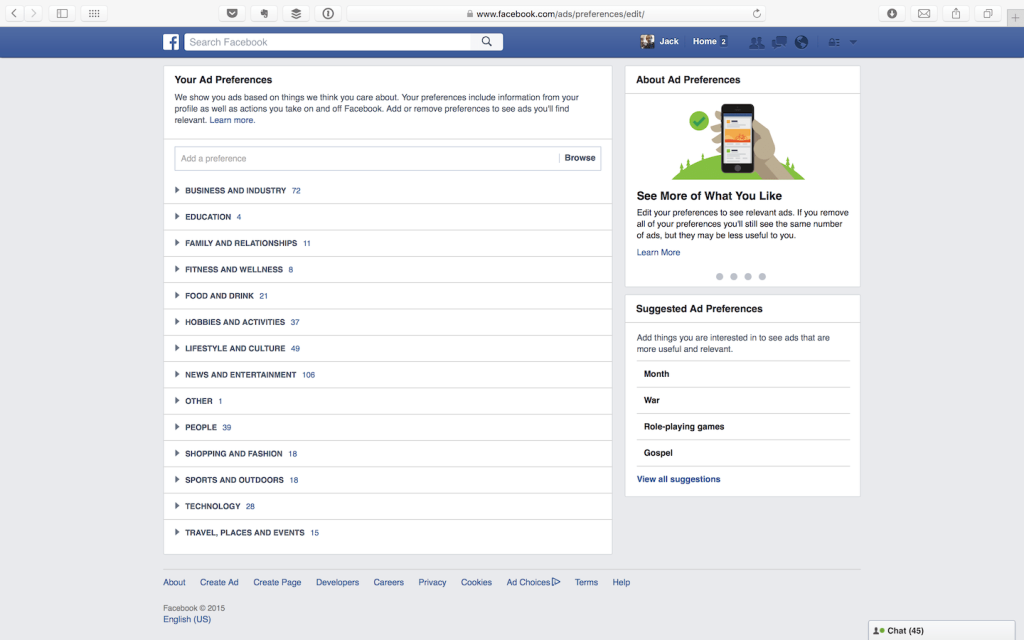I’ll be giving at talk at WordCamp NYC this month, so I thought I’d explore some of the ideas I’ll be touching on in blog form. I’d love your feedback below to further my research. This essay delves into an aspect of owning your own data vs. being someone else’s product.
Speaking personally, as a consumer, what sort of advertising would I actually like?
As a consumer, I like to find out about new things, or new products from companies whose products I like. Let’s get this out on the table, advertising isn’t necessarily bad.
As a product creator, I want to get it in front of people in case they need it.
On the other hand, waking up in the morning to 100+ emails in my inbox is ridiculous. And clicking a link to an article but not being able to find it on the page due to the 80⁄20 ratio of ads/content, is absurd.
What if there was a platform on which you could indicate somehow what things you were interested in, and based on that advertisers could target you (ahem, Facebook)?
Or what if when you were actually looking for something, creators of what you are looking for, or similar things, could let you know what they had to offer when you were looking for them (ahem, google)?
This weirdo loves ads. Probably not a weirdo. A well-written article, but it is hard to tell if the tone of the post is serious or not. She does make an important point about how ideally ads can work.
Some ads are outright adorable, hence, very effective.
So why do we hate ads?
With iOS9 one feature Apple added was the ability to create adblockers. Consequently the adblocking category exploded in the app store. Google it and it’s all people can talk about right now.
This demand for adblockers clearly indicates a market desire for blocking ads.
But why?
I have a few theories… and feel free to add your own below.
1) Freemium Media
Since the early days of the internet, the predominant model for supporting media has been advertising. As Jaron Lanier, the author of Who Owns the Future?, has argued, “The whole business of using advertising to fund communication on the Internet is inherently self-destructive.” We see that destruction inherent within this adblocker-driven backlash.
Can you really blame consumers of media? When you open most publications, even “respectable” ones have so many ads that it’s hard to find the content. Publications need their readers to see or click on a quota of ads in order to support themselves, but the readers have all become blind to the ads due to the overwhelming amount of them.
It has become a vicious cycle of more and more ads being added to the pages because obtuse or uncaring ad execs pile them on the page trying to trick visitors into clicking so they can meet their quota.
“It turned out not to be a sustainable business model. The number of websites, and thus the supply of slots for ads, went up exponentially every few months, but the total amount of advertising dollars remained relatively flat.”
– Walter Isaacson. “The Innovators”
This pattern also fuels the trend towards clickbait titles and articles pushing the majority of consumed ideas to the lowest common denominator, but that’s a different essay altogether.
2) The Creepy Factor
The major social and search engines have earned names for themselves as stalkers. You search for a product on Google and ads relating to the product follow you across every website you visit henceforth. You Like something on Facebook, post something to your status, or Retweet something and more ads follow you.
There is a battle being waged over your privacy among technologists. For every bill that comes out due to lobbying by media companies, and government agencies who want to open access to your online behavior, there are organizations like the EFF and Mozilla who fight against this legislature. For every “Evercookie” created to track you no matter what you do to get rid of them, there are adblockers that are developed against them.
I really do feel for product makers trying to sell their products, and services that rely on advertising to keep the doors open, but there is a line where following my tastes and behavior becomes invasive and abusive. The Evercookie, for instance, blatantly ignores a users intent to not be followed.
So what is the ideal advertising model?
Tracking users is an effective tool, because of relevance. If an ad is relevant to my needs I am more likely to follow that thread to see if it leads somewhere helpful. But on the other hand, THEY. ARE. CREEPY. Especially when I request not to be tracked.
What creeps me out most about tracking is that it is very hard to know whose hands my profile will fall into. Install Ghostery and see who is tracking you. Do you know who all those companies are? What do they intend to do with this data they track about you? Are their servers secure? Are they anonymizing your data? What happens if they’re hacked—could someone steal your identity, or build a profile about you to attack you or someone you know personally?
To Facebook and Google I am an ID in an enormous database. It would cost too much for them to store irrelevant details about me. There is a profile for my tastes. That doesn’t bother me. I actually like that I can go into my preferences on Facebook and say exactly which things I’d like to see ads for. I’d love if this were universal across the web, this and only this.
Google has this too.
There is a huge difference between practices akin to Evercookies and this. Respect. Its also clear, when you visit a site and there are ads everywhere, that you are not respected. I believe that this is what the adblocker backlash is about.
Aside, Amazon has a similar tool, but the implementation is half-assed.
Another essential aspect of effective advertising is who says so besides you. It’s one reason why Facebook Likes are so powerful, why Hacker News is a boon for startups, and why Product Hunt launched so effectively. This topic, though, is a whole other essay.




You must be logged in to post a comment.